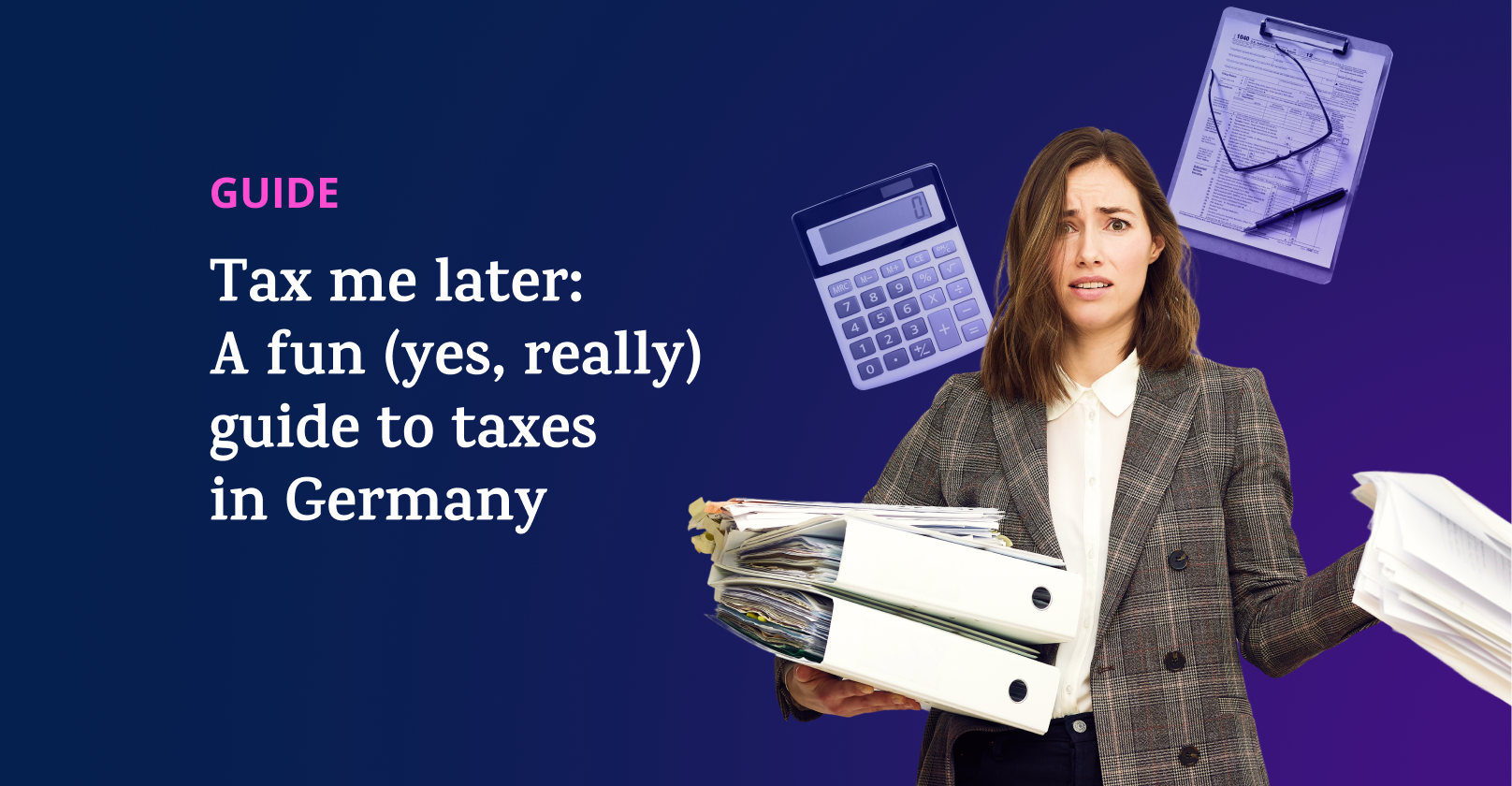Freelancing in Germany: Your starter pack to self-employment

TL;DR: Freelancing in Germany means working independently under Germany’s self-employment rules. You’ll need to choose between Freiberufler (liberal professions) or Gewerbetreibender (trade-based business), register with the local tax office, and set up insurance and invoicing correctly to work legally and get paid.
Welcome to freelancing in Germany. Your adventure begins here.
This guide is your Freelance Starter Pack. We’ll walk you through everything you need to know, including visas, Anmeldung, tax numbers, insurance, contracts and more. The goal? To help you focus on actual work — and get paid without setting off any bureaucratic alarms.
You’re a global talent (or dangerously close to becoming one). You’ve got the skills to build, create, consult or code. And you’ve chosen to set up shop in Germany, the land of Ordnung, sausage and stress-inducingly specific tax codes.
From Berlin’s buzzing startups to Munich’s polished corporations, Germany’s economy thrives on the skills and creativity of independent professionals — like you.
So, take a deep breath, sharpen your pencils (or just charge your laptop), grab a coffee (or three) and get ready to freelance the German way. It’s organized and official, sure, but it’s still somehow totally you.
- The basics: What freelancing means in Germany
- Freelance visa options: What’s your entry ticket?
- ‘Anmeldung’, ‘Steuernummer’ and other official stuff
- Taxation for freelancers
- Health insurance: Which one should you choose as a freelancer?
- Social security and future planning
- Managing your money like a pro
- Avoiding the dreaded ‘Scheinselbstständigkeit’
- Legal landmines (and how to avoid them)
- FAQs
The basics: What freelancing means in Germany
In short: Freelancing in Germany means being self-employed under specific legal categories — Freiberufler or Gewerbetreibender. Both require registration with the tax office and come with unique rules, but offer flexibility and independence.
Being your own boss, working on your own terms and grabbing a delicious Bretzel from the bakery whenever your soul demands it. Does this sound like a dream? It is, mostly. But freelancing in Germany also comes with some decidedly non-dreamlike aspects, such as official labels, mandatory registrations and its own set of tax rules.
Let’s get started, so you can get back to that Bretzel.
What is freelancing in Germany?
In short: In Germany, freelancing falls under two categories: Freiberufler (liberal professionals like designers, consultants, or teachers) and Gewerbetreibender (business owners running commercial activities like e-commerce or trades). The main difference lies in registration type and tax treatment.
Freiberufler vs. Gewerbetreibender: Who's who in the freelance zoo?
Not all freelancers are created equal in Germany. Depending on what you do, you’ll be classified as one of the following:
- Freiberufler (freelancer): The non-commercial crew. Think creators, coders, consultants and academics.
- Gewerbetreibender (business owner): The commercial gang. Think shops, ecommerce, trades and side hustles that involve selling stuff.
Both have the same “I work for myself” energy, but come with different paperwork headaches.
| Freiberufler | Gewerbetreibender | |
| Legal form | Non-commercial | Commercial |
| Tax office registration | Required | Required |
| Industries | IT, media, design, consulting, education, healthcare | Ecommerce, retail, various trades, online shops |
| VAT handling | Yes (Umsatzsteuer rules apply unless you’re classified as a Kleinunternehmer) | Yes (same story, different forms) |
Pro tip: Not sure where you fall? The Finanzamt decides your fate, but you can (and should!) make a case for your category in your registration form.
| German words you’ll hear too often | |
| Finanzamt | Tax office. Your pen pal for life. |
| Ausländerbehörde | Immigration Office. Where paperwork goes to multiply. |
| Steuernummer | Your local tax number. Heads up: it may change if you move. |
| Steuer-ID | Your forever tax ID. Tattooed to your bureaucratic soul. |
| Kleinunternehmerregelung | “Small business” VAT exemption. Less paperwork, lower stress. |
Who can freelance in Germany?
In short: You can freelance in Germany if your profession qualifies as a Freiberufler (liberal profession) or if you register a trade as a Gewerbetreibender. Typical freelancers include IT pros, designers, consultants, and creatives, but some roles must register as a business.
Freelancing isn’t a free-for-all. Certain jobs officially qualify you as a Freiberufler, while others fall into the Gewerbe bucket. Typical freelance gigs include:
- Developers and IT pros
- Designers, illustrators and creatives
- Consultants and coaches
- Artists, writers and journalists
- Doctors, therapists and lawyers
- Teachers, translators and scientists
If your job doesn’t neatly fit the Freiberufler list, the Finanzamt may classify you as Gewerbetreibender. That means you’ll need a Gewerbeanmeldung (business registration). More forms incoming!
Should you do it?
In short: Freelancing in Germany offers flexibility, creative freedom, and potential tax perks. But it also brings paperwork, uncertainty, and fewer safety nets. It’s ideal if you value independence and can handle bureaucracy like a pro.
Freelancing has its charms — and its challenges. To help you decide if you’re cut out for it, consider the following pros and cons.
Pros
- Flexible hours (Sleep in. Or do your best work at 2 a.m.)
- Work from anywhere: cafés, co-working spaces or your sofa
- Creative freedom to pick projects you love
- Take a break (or a holiday) whenever you need one (no more “approved vacation days”)
- Bond with your pet. Talk to them. Call them your coworker.
- Potential tax deductions for work gear, travel… even that ergonomic chair
Pro tip: Yes, you can deduct some work-related expenses, but keep those receipts organized. Germany loves a paper trail.
Cons
- A lot of paperwork, especially at the start (the Finanzamt never sleeps)
- No employer perks like health insurance, paid holidays or pension contributions
- Unpredictable income (goodbye steady paycheck, hello sleepless nights)
- Lonely Tuesdays when everyone else is at “real” work
Freelance visa options: What’s your entry ticket?
In short: To work as a freelancer in Germany, non-EU citizens need a Freiberufler Visa or a Self-employment Visa, depending on whether your work is creative/intellectual or commercial. EU/EEA/Swiss citizens can skip the visa but still need to register for taxes.
Moving to Germany and wanting to freelance? Before you unpack your laptop or your Etsy-worthy crochet needles (who said there’s only one way to earn money as a freelancer?), you’ll need the right visa. Here’s the lowdown:
‘Freiberufler’ Visa (for creative and intellectual work)
In short: The Freiberufler Visa is for independent professionals in creative, academic, or intellectual fields (artists, writers, developers, and teachers). You’ll need to prove your qualifications, client interest in Germany, and financial stability.
This one’s for the artists, writers, devs, designers, teachers and other intellectual gladiators. If your work is more “headspace” than “shopfront,” this is likely your match.
Eligibility checklist
- You’ve got relevant qualifications or professional experience.
- You can prove there’s demand for your work in Germany.
- You can financially support yourself.
Required documents
- Valid passport
- CV and portfolio
- Proof of health insurance (a non-negotiable in Germany)
- Contracts or letters of intent from German clients
- Financial plan showing you won’t starve (bank statements, savings, etc.). You can find official templates from the Ausländerbehörde online in German or English.
Pro tip: A signed client letter from a German company is worth a thousand portfolio links. The Ausländerbehörde loves certainty.
Application timeline
Expect 3–6 months from application to decision (depending on how speedy your local Ausländerbehörde feels).
Self-employment visa (residence permit)
In short: The Self-employment Visa (for Gewerbetreibende) applies to commercial freelancers or entrepreneurs: people offering business, trade, or e-commerce services. It requires a solid business plan and proof your work benefits the German economy.
If your freelance hustle is more entrepreneurial — consulting, running an online shop, offering commercial services — then this visa’s for you.
How it differs from the Freiberufler visa
- Aimed at Gewerbetreibende (commercial freelancers/entrepreneurs)
- Requires a business plan and financial forecasts
- You may need to show that your business benefits the German economy or fills a local demand
Pro tip: If you’re an EU/EEA/Swiss citizen, you don’t need a visa at all — but you do need to register with the Finanzamt if you want to freelance legally. Paperwork still finds you, no matter which passport you hold.
Other visa pathways
In short: There are several other routes to freelancing in Germany. You can transition from a Job Seeker Visa, switch from a Blue Card, or start freelancing directly as an EU/EEA national.
Not everyone lands in Germany on a shiny freelancer visa. Sometimes, you sneak in through the side doors:
- Transitioning from a Job Seeker Visa: Came job-hunting but found clients instead? You can apply to switch to a freelance or self-employment permit once you’ve got contracts lined up.
- EU/EEA Nationals: No visa drama for you! You can live and freelance in Germany right away. Just remember to register with the Finanzamt, so your freelance life is 100% above board.
- Blue Card holders: Good news! It’s possible to pivot from a Blue Card to freelance status, but you’ll need to notify the Ausländerbehörde and prove your freelance work ticks all their boxes.
You’re already in? Great. Just don’t forget to tell the Ausländerbehörde you’re going rogue.
‘Anmeldung’, ‘Steuernummer’ and other official stuff
In short: Before freelancing in Germany, you’ll need to register your address (Anmeldung), notify the tax office (Finanzamt), and get your tax numbers (Steuernummer and USt-IdNr.). Without these steps, you can’t legally invoice clients or open a business bank account.
Before you even dream of sending your first invoice, you’ll need to survive the German paperwork boss battle. Whisper it with us: Anmeldung.
Why getting an ‘Anmeldung’ matters for freelancers?
The Anmeldung is the official address registration that makes you visible to the German system. Without it, you can’t open a bank account, get health insurance or apply for a freelance visa. In other words: no Anmeldung, no adulting (or surviving) in Germany.
Why you need it
- Unlocks your Steuer-ID (tax ID)
- Proves you actually live where you say you live
- Essential for everything from phone contracts to Netflix taxes (yep, those exist)
Your Anmeldung checklist
- Passport (and residence permit, if applicable)
- Apartment contract and Wohnungsgeberbestätigung (landlord confirmation form)
- Anmeldung form (download it from your city’s website)
- Appointment at the Bürgeramt (book early, because slots vanish faster than Glühwein at a Christmas market)
Registering as a freelancer with the ‘Finanzamt’
In short: After your Anmeldung, you must register with the Finanzamt (tax office) using the Fragebogen zur steuerlichen Erfassung form. This tells the government you’re working independently and defines whether you’re a Freiberufler or Gewerbetreibender.
Once you’ve conquered the Anmeldung, your next quest is the Finanzamt (tax office). This is where you tell Germany, “Hey, I’m freelancing now, but we can still be friends.”
Where to go and what to fill out
- Head to your local Finanzamt (or their online portal).
- Fill out the Fragebogen zur steuerlichen Erfassung (tax registration questionnaire). This form asks for your personal details, bank account, estimated income and whether you’re registering as a Freiberufler or Gewerbetreibender.
Freiberufler vs. Gewerbe registration
- Freiberufler: You register directly with the Finanzamt. Quick and relatively painless.
- Gewerbetreibender: You first register a business (Gewerbeanmeldung) with your local trade office, then trot over to the Finanzamt with that info.
Think of it as two different entrances to the same bureaucracy maze. You’ll end up paying taxes either way, just with different keys.
How do tax numbers work?
In short: Freelancers in Germany usually have two tax numbers: the Steuernummer (issued by your local Finanzamt for income tax) and the USt-IdNr. (VAT ID for handling VAT and cross-border invoices).
Germany loves numbers, so naturally you’ll have at least two. Let’s clear up the difference between your Steuernummer and your VAT ID (USt-IdNr.).
| Steuernummer | VAT ID (USt-IdNr.) | |
| Who issues it | Your local Finanzamt | The Bundeszentralamt für Steuern (Federal Tax Office) |
| Purpose | Used for communication with your local tax office (e.g., tax returns, income tax, etc.) | Used for handling VAT (Umsatzsteuer), especially on invoices, both within and outside of Germany |
| Where you’ll see it | On your tax returns; in correspondence from the Finanzamt | On invoices (if you charge VAT) |
| Do you always need it? | Yes, if freelancing/self-employed | Yes, if your annual income goes above the Kleinunternehmer threshold. It’s also required for EU cross-border invoicing. |
Quick tip:
- Stay under €25,000 net revenue in year one and choose the Kleinunternehmerregelung, which lets you skip VAT (less paperwork, more chill).
- Cross that line? Congratulations, you’re in VAT land, and you’ll need to add, track and file Umsatzsteuer. It’s extra work, but a VAT ID is handy if you want to work with international clients.
Even if you’re under the threshold, some clients (especially businesses based abroad) may require a VAT ID. It’s better to know the rules than to get surprise emails from the Finanzamt.
Taxation for freelancers
In short: Freelancers in Germany pay income tax, may need to charge VAT, and can deduct legitimate business expenses. Taxes depend on your income bracket and whether you qualify for the Kleinunternehmerregelung (small business rule).
You’ve registered. You’ve got your tax numbers. Maybe you’ve even scored a client or two. Congrats! Now it’s time for the real joy of freelancing in Germany: taxes.
Income tax
In short: Germany uses a progressive income tax system. The more you earn, the higher your rate, but only the income in each bracket is taxed at that rate.
Germany runs on a progressive tax system. In other words, the more you earn, the higher your tax rate. But don’t panic: you only pay the higher rate on the income that falls within that bracket.
Confused yet? Think of it like climbing stairs. Every new step costs a bit more energy… but you don’t pay Step 10 prices while you’re still chilling on Step 3.
| 2025 tax brackets for freelancers | |
| €0–€12,096 | 0% (Grundfreibetrag/tax-free allowance) |
| €12,097–€17,443 | 14–24% (the climb begins) |
| €17,444–€68,480 | 24-42% (solid chunk) |
| €68,480-€277,826 | 42% (Flat rate for higher incomes) |
| Over €277,826 | 45% (top tier, hello high roller) |
VAT (‘Mehrwertsteuer’)
In short: VAT in Germany applies to freelancers earning over €25,000 annually, unless they opt for the Kleinunternehmerregelung small-business exemption. Standard VAT is 19%, reduced VAT is 7% for essentials.
VAT (Mehrwertsteuer) is Germany’s favorite tax twist. It’s not just for big companies; freelancers get to play the game, too.
When you must charge it
- Stay under €25,000/year? You can opt into the Kleinunternehmerregelung (small business rule). That means no charging VAT and no filing VAT returns.
- Go above €25,000 net revenue (or skip the small business rule)? Then you must add VAT (usually 19%, or 7% for books, food and other labelled as Grundbedarf) to your invoices.
The Kleinunternehmerregelung
- Great for beginners: Fewer forms, fewer headaches
- Downside: You can’t reclaim VAT on your own expenses (bye, VAT refund on that fancy MacBook)
- Remember: You must declare this choice in your Fragebogen zur steuerlichen Erfassung.
How to file VAT returns
- Submit an Umsatzsteuervoranmeldung (advance VAT return). This is usually done quarterly, though you may need to do it monthly if your income’s higher; the Finanzamt will tell you which applies in your case.
- File your return through Germany’s favorite bird-themed portal: ELSTER. Like a magpie, it will make some of your shiny coins disappear more quickly than you can say Umsatzsteuervoranmeldung.
Pro tip: Track your VAT separately in your invoices and accounts from Day One. It’s not your money, even if it looks nice sitting in your bank account.
Tax deductions and prepayments
In short: Freelancers can deduct work-related expenses such as office rent, equipment, and travel. They also make quarterly prepayments (Vorauszahlungen) based on estimated income.
The good news? Not all your money goes straight to the Finanzamt. Germany allows plenty of deductions, if you keep those receipts.
Deductible expenses (a freelancer’s best friends):
- Rent paid for a coworking space or the portion of your home dedicated to an office setup
- Internet and phone bills
- Laptops, software and work-related gear (hello, ergonomic chair)
- Travel costs for client meetings (yes, even train snacks apply if they’re work-related)
- Courses, workshops and training
Vorauszahlungen (advance tax payments):
The Finanzamt doesn’t like surprises. Once you start earning income, they’ll often ask for quarterly advance payments:
- Earn more than expected? You’ll owe extra later.
- Earn less? You’ll actually get some cash back!
Pro tip: If you’re spending more time Googling tax terms than doing client work, it’s time to hire a Steuerberater (tax advisor). They speak fluent Finanzamt so you don’t have to.
Health insurance: Which one should you choose as a freelancer?
In short: Health insurance is mandatory in Germany. Freelancers must choose between GKV (public) and PKV (private). Public insurance bases costs on income, while private insurance bases them on age, health, and coverage level.
In Germany, health insurance isn’t optional. That might feel like someone’s trying to steal your “I’ll take my chances” freedom, but trust us: when the hospital bill arrives, you’ll thank the system.
As a freelancer, you get to choose between two main options:
- GKV (Gesetzliche Krankenversicherung) → Public insurance
- PKV (Private Krankenversicherung) → Private insurance
Both keep you covered, but the ride feels very different.
Public insurance (GKV)
In short: Public health insurance (GKV) covers medical basics and depends on income, not age or health. It’s reliable but less flexible.
Most freelancers start here. Costs are based on your income, not your age or health.
Pros
- Stable, reliable coverage
- Family members (spouse + kids without their own income) are included for free
- Covers all the basics (doctor visits, hospital stays, meds)
Cons
- Limited flexibility in doctors and services
- Longer wait times for specialist appointments
- Contributions stay high, even if you hardly use it
Private insurance (PKV)
In short: Private health insurance (PKV) offers customized plans, faster access, and lower initial costs for young freelancers — but gets expensive with age and is hard to switch back from.
Available if you earn above a certain income threshold, or fit certain categories (e.g., artists/academics).
Pros
- More options, faster specialist access
- Tailored coverage to your needs
- Can be cheaper for young, healthy freelancers
Cons
- Premiums rise with age (and can get expensive)
- Switching back to GKV later is notoriously difficult
What about partners and kids?
In short: In GKV, dependents are covered for free. In PKV, each family member needs their own policy.
| Insurance type | Family coverage | Typical audience |
| GKV | Dependents without income are covered for free | Families, parents |
| PKV | Each member needs a separate policy | Solo freelancers, high earners |
Pro tip: The best option for you will likely depend on your household setup and other lifestyle factors. Solo freelancers often find PKV appealing, while families lean toward GKV for the built-in coverage.
Social security and future planning
In short: Freelancers in Germany manage their own pension, sick pay, and unemployment safety nets. Some professions can access public pension or KSK (artists’ social fund).
Germany loves planning ahead. So should you.
Freelancing gives you freedom, but it also means you are in charge of your own safety net if you’re planning to live past 60. In other words, you’re on the hook for your pensions, sick pay and unemployment coverage.
Retirement contributions
In short: Freelancers can voluntarily pay into the state pension (Rentenversicherung), join the Künstlersozialkasse (KSK) if eligible, or set up private pension plans.
There are different ways to think about your golden years:
- Public pension system (gesetzliche Rentenversicherung)
Most freelancers aren’t required to contribute, but some professions (like teachers, artists and journalists) must. Voluntary enrollment is possible if you want the state’s stability.
- Freelance-specific schemes
The Künstlersozialkasse (KSK) supports artists, writers, musicians and certain media pros. It splits pension and health contributions with the government. It’s like having a part-time “employer” for social security.
- Private pensions
Many freelancers top up with private retirement plans.
Sickness and unemployment
In short: Freelancers must arrange their own sick pay and unemployment safety nets. With GKV, you can opt into Krankengeld; unemployment benefits are limited unless you paid into the system as an employee.
No one likes to think about it, but sickness and job gaps happen. While full-time employees are generally taken care of in these circumstances, freelancers must plan ahead and think differently.
- Sick leave: As a freelancer, you don’t automatically get paid sick days. With GKV, you can opt into Krankengeld (sick pay) coverage for an extra premium. PKV plans may offer similar add-ons.
- Unemployment benefits: As a freelancer, you usually don’t qualify for ALG I (unemployment insurance), unless you previously paid into the system as an employee.
- If things get rough, ALG II (Bürgergeld) is the last-resort welfare option, but it comes with strict means testing.
Managing your money like a pro
In short: Freelancers in Germany must issue legal invoices, use contracts, and track deductible expenses to stay compliant.
Freelancing isn’t just about doing the work (though that’s already plenty). You’ve also got to chase invoices, manage contracts and keep the Finanzamt smiling. Here’s how to adult your finances in Germany.
Contracts and invoices
In short: Invoices must include your details, client details, tax number, service description, and dates. Always use written contracts with clear terms.
Invoices
German invoices aren’t just “hey, pay me.” By law, they must include:
- Your name and address (and your client’s, too)
- Invoice date and sequential number (no skipping!)
- Your Steuernummer or VAT ID (if you’re charging VAT)
- Description of services provided
- Date of service/delivery
- Net amount, VAT amount (if applicable) and total
Contracts
Even if it feels “casual,” always have something in writing. Useful clauses include:
- Late-payment terms – so you’re not ghosted by clients with outstanding invoices.
- Scope definition – to protect against never-ending “just one more tweak.”
- Cancellation terms – so you’ll still get paid if a project dies before completion.
What you can (and can’t) deduct
In short: You can deduct legitimate business expenses like office costs, travel, and equipment — but not personal or mixed-use items.
Freelancers get plenty of chances to soften the tax blow, but only for legit expenses. So, even though you call your cat your “furry little helper,” you might get into trouble listing cat food as a tax expense.
What you can deduct
- Home office costs (if it’s a separate room used exclusively for work)
- Business travel and client meetings
- Software, equipment, subscriptions
- Training, workshops, professional memberships
What you can’t deduct
- Your entire rent if you work from your couch
- Random “research dinners” with friends
- That new gaming PC (unless Twitch streaming is your paid gig)
Tax-saving strategies
- Track expenses from Day One. Messy shoebox accounting will hurt you later.
- Keep business and personal bank accounts separate.
- Consider a Steuerberater to spot deductions you’d never think of.
Avoiding the dreaded ‘Scheinselbstständigkeit’
In short: Scheinselbstständigkeit (false self-employment) happens when a freelancer works like an employee for one main client. It can trigger audits, fines, and loss of freelancer status.
Just saying it feels intimidating, right? Scheinselbstständigkeit already sounds like something that haunts you in a bureaucratic nightmare. If you say it three times in front of the mirror, the Finanzamt appears. To avoid it, you’ll first need to know what it is.
What is it and why it’s scary
Scheinselbstständigkeit = “false self-employment.” It’s when you’re technically freelancing, but the authorities decide you’re basically an employee in disguise.
If flagged, your client may owe back taxes, pension contributions and social contributions. You could lose your freelancer status altogether, or suffer damage to your reputation and future contracts.
Red flags and how to stay safe
To avoid being mistaken for an undercover employee, make sure your setup looks freelance-y enough:
- Work with multiple clients (not just one main payer)
- Set your own working hours and location
- Use clear contracts stating you’re an independent contractor
- Show business independence (website, branding, your own tools)
- Be aware: the Deutsche Rentenversicherung (German Pension Insurance) audits freelancers and can investigate borderline cases
Pro tip: If most of your income comes from a single client, take extra steps to show independence — or consider a part-time employment contract, instead.
Legal landmines (and how to avoid them)
In short: Common legal issues include client disputes, missing contracts, and cross-border payment terms. Use written agreements and understand VAT rules for international clients.
Freelancing isn’t all flat whites in cafés and creative freedom. Sometimes, you hit legal bumps. Here’s how to dodge (most of) them.
Client disputes and contracts
In short: Start with mediation for disputes; if that fails, use small claims court (Amtsgericht). Prevent issues with strong written contracts.
Even the best client relationships can go sour. When they do:
- Start with mediation: A calm conversation or a neutral third party can save time and money.
- Small claims court (Amtsgericht): If all else fails, you can take disputes to court to settle unpaid invoices or contract breaches.
Protect yourself upfront:
- Always use written contracts (scope, payment terms, deadlines)
- Add late-payment clauses and “kill fees” for cancelled projects
- Keep communication documented (emails, signed agreements)
Working with clients outside Germany
In short: When freelancing internationally, clarify contracts, currencies, and VAT rules. EU clients follow intra-community VAT; non-EU invoices may be VAT-exempt.
International gigs are exciting, but they can add layers of complexity. As an expat, you’re likely to start working with international clients, so here’s what you need to know:
Contracts
Define jurisdiction (ideally German law, though clients may push for theirs). At a minimum, define how disputes are resolved.
Currencies
Agree on who covers exchange fees. Services like Wise or PayPal Business help smooth cross-border payments.
Taxes
- For EU clients, VAT rules change (intra-community supply)
- For non-EU clients, invoices may be VAT-exempt — but you still need to document it properly for the Finanzamt
Pro tip: Keep a list of trusted contract templates for international projects — and don’t hesitate to ask a lawyer or Steuerberater if the fine print makes your head spin.
FAQs
Who qualifies as a freelancer in Germany?
You qualify as a freelancer (Freiberufler) if your work is in one of the liberal professions such as teaching, design, writing, translation, or consulting. Other self-employed people are usually classed as Gewerbetreibende and must register a business.
Do I need a visa to freelance in Germany?
Non-EU or EEA citizens need a freelance visa (Freiberufler-Visum) issued by the local immigration office. You must show professional qualifications, client contracts, and proof that your income will cover living costs.
How do I register as a freelancer in Germany?
Freelancers register by submitting the Fragebogen zur steuerlichen Erfassung to their local Finanzamt (tax office). Gewerbetreibende also register their business at the Gewerbeamt before applying for a tax number.
What’s the difference between a 'Freiberufler' and a 'Gewerbetreibender'?
Freiberufler are liberal professionals (teachers, writers, designers) who register only with the tax office. Gewerbetreibende run commercial businesses and must register at the Gewerbeamt and pay trade tax.
What taxes do freelancers pay in Germany?
Freelancers pay income tax and possibly VAT (Umsatzsteuer) if annual revenue exceeds €25,000 net income a year. Gewerbetreibende also pay trade tax (Gewerbesteuer).
Ready to freelance the German way?
You’ve navigated the maze of Anmeldung, visas, tax numbers and insurance.
You’ve learned how to protect yourself with contracts, manage your money and dodge pitfalls like Scheinselbstständigkeit.
Along the way, you’ve picked up the German tax lingo and turned your knowledge of the system into a tool you can actually use.
Yes, freelancing in Germany may come with its fair share of paperwork (because this is Germany, and bureaucracy is the unofficial national sport). But it also opens the door to independence, flexibility and a career you can shape on your own terms. By doing things by the book (i.e., the boring way), you’re building a solid foundation for long-term success.
You’ve got the knowledge. You’ve got the tools. Now it’s your move.

Begin your personal language journey
- Courses tailored to your learning needs
- Qualified teachers, small class sizes
- Expert-designed curriculum
- Live classes with native-level teachers










